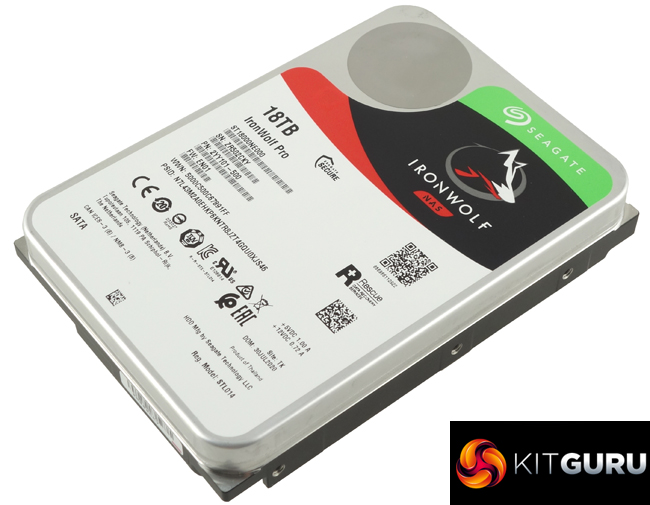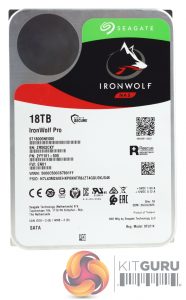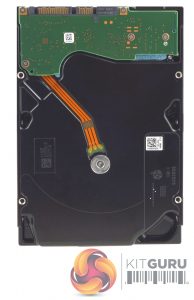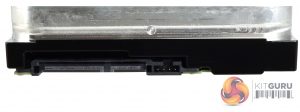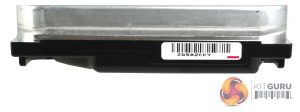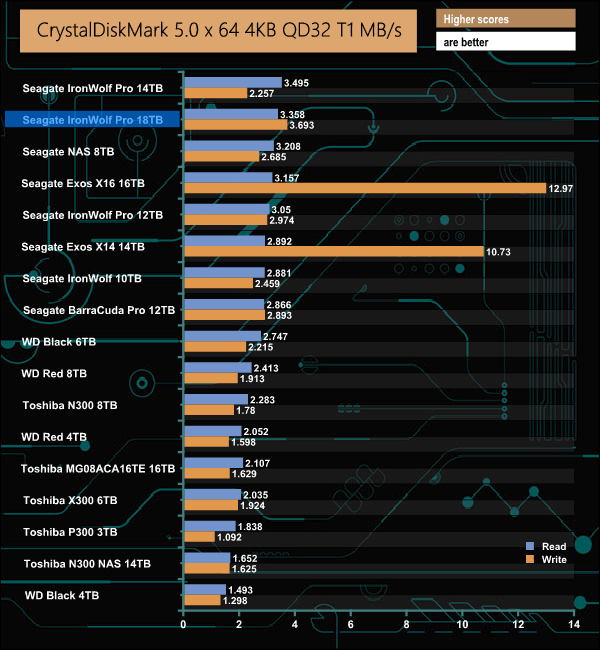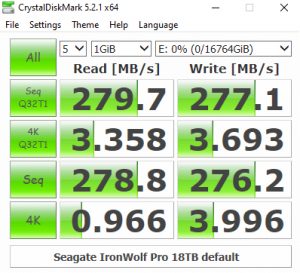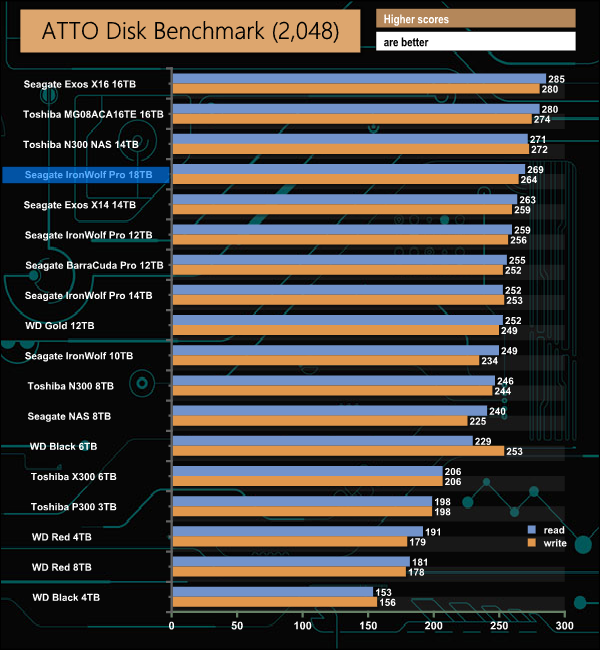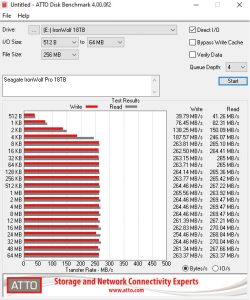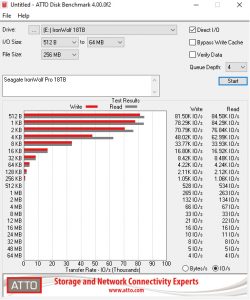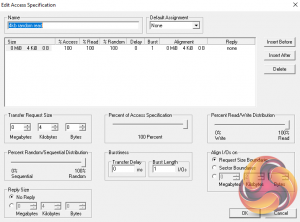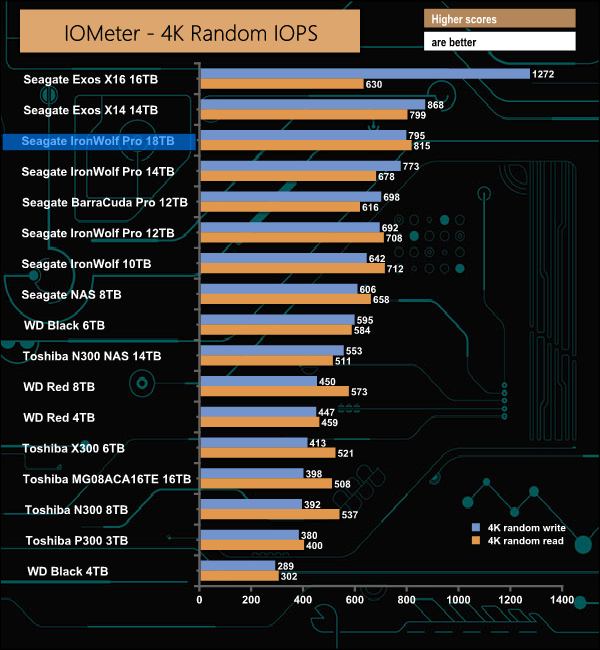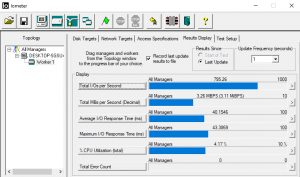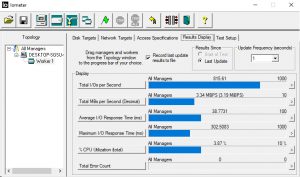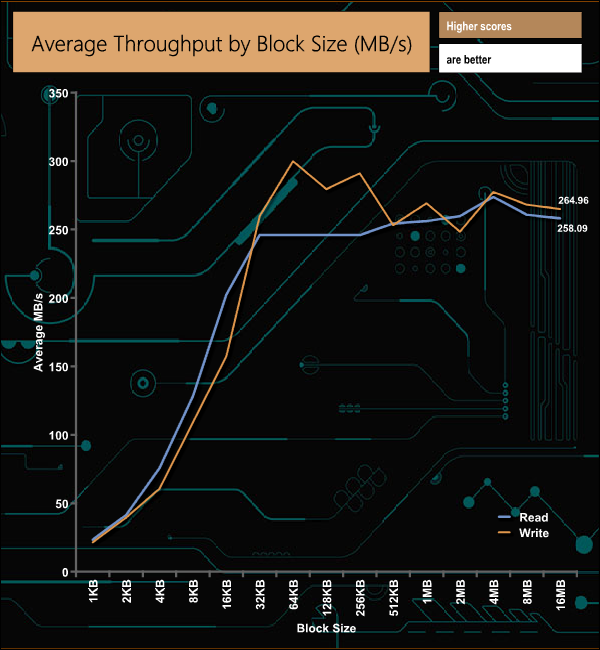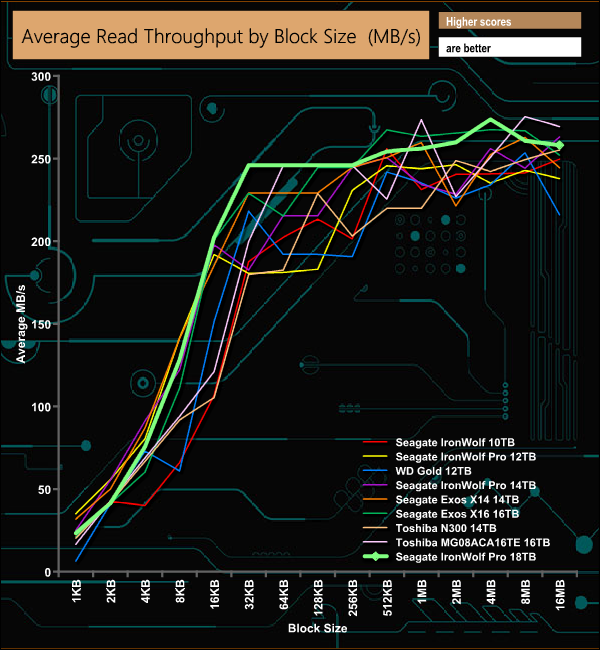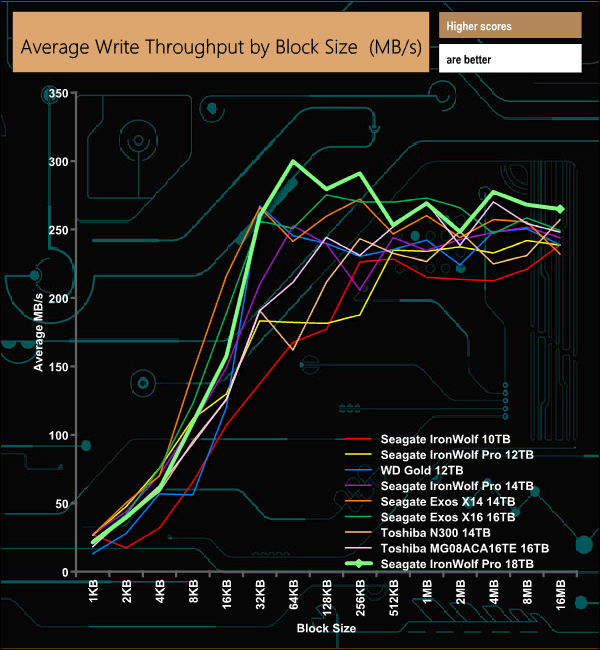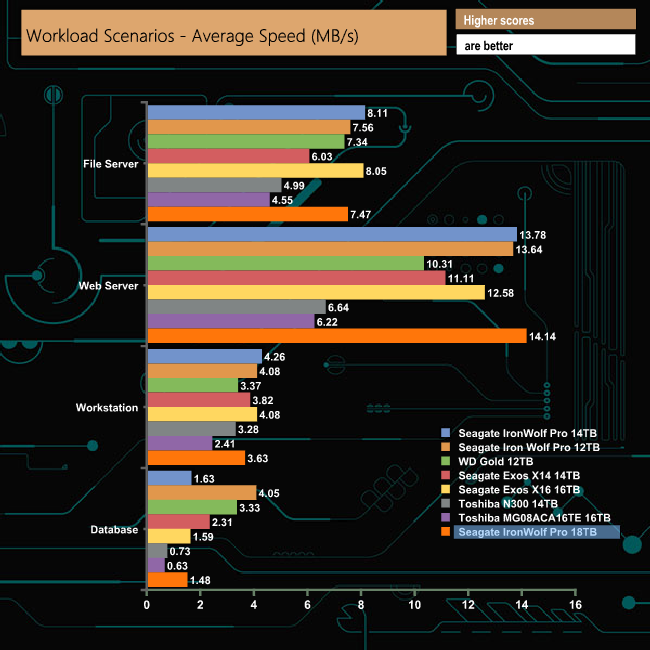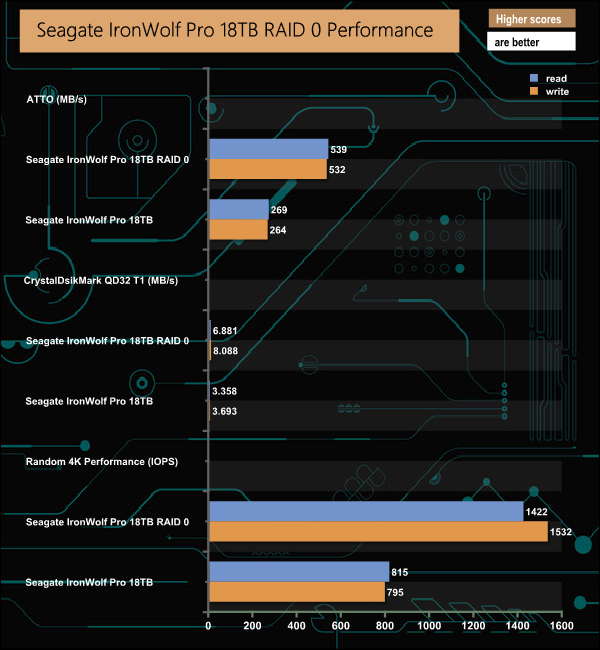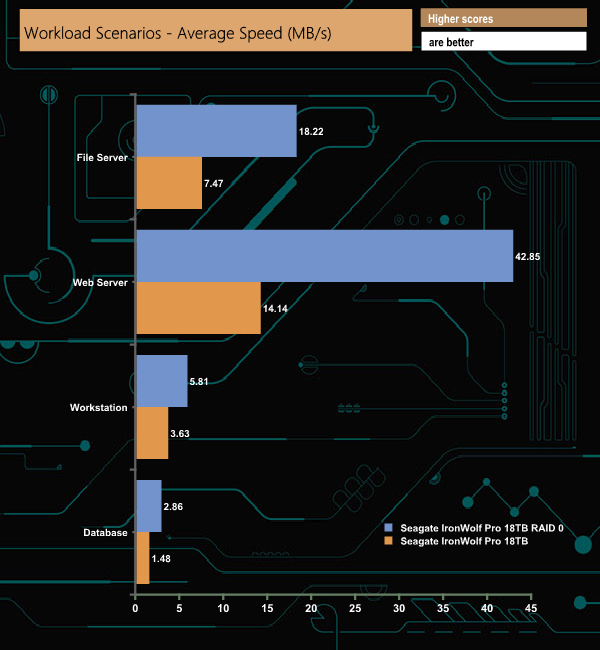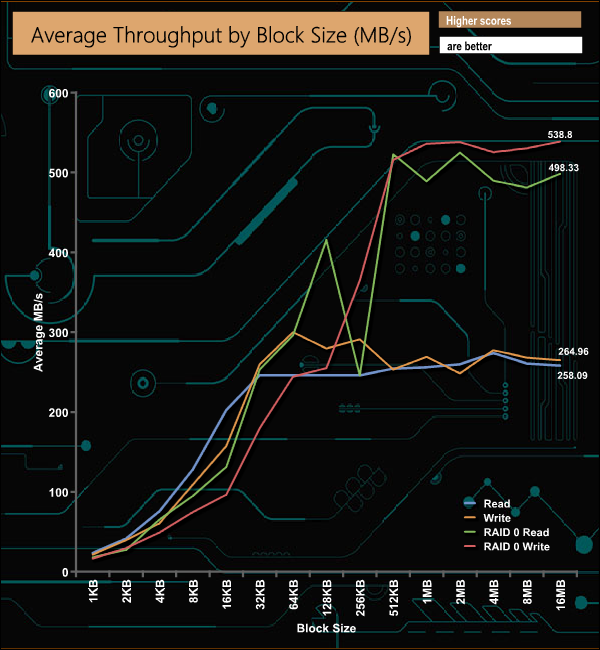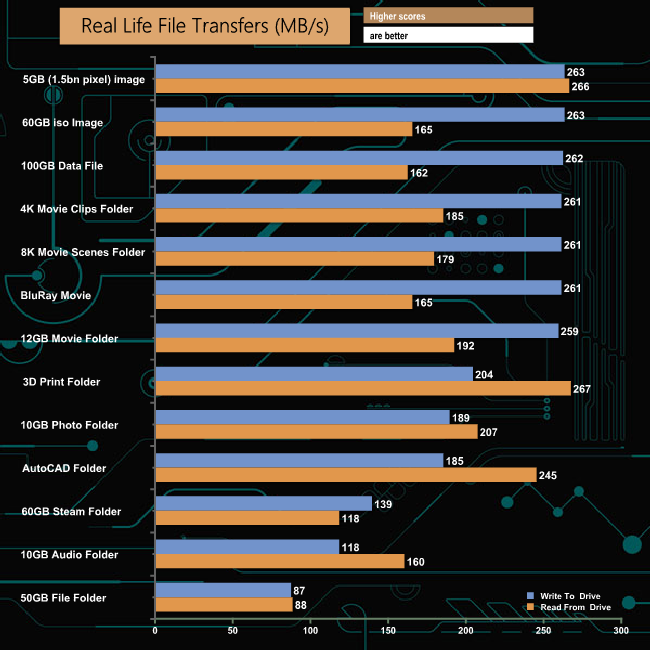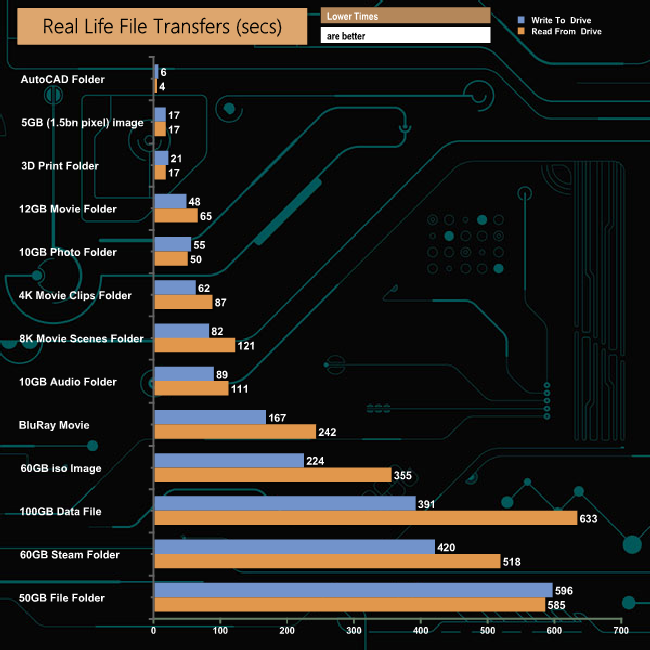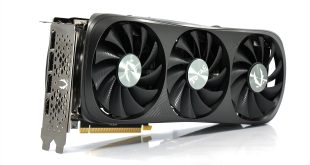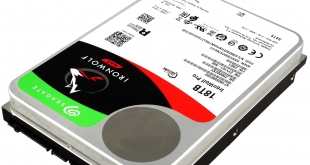
The latest flagship model to join Seagate's range of IronWolf Pro hard drives, designed to support commercial and enterprise NAS devices ranging from single bay designs up to 24-bay units, is the humongous 18TB model. If you are happy to shell out over £500 for one of these, what sort of performance can you expect?
As with most hard drives, these days the 18TB IronWolf Pro (ST18000NE000) uses Helium technology which allows for 9 x 2TB platters together with 18 heads to be crammed into a 3.5in format drive with a height of just 26.11mm. The drive has a spindle speed of 7,200rpm with a 256MB cache which gives the drive an official transfer rate of 260MB/s while the average latency is quoted at 4.16ms.
Seagate quote power ratings for the 18TB IronWolf Pro as 1.25W standby, 1W sleep, 5.2W average idle and 8W average active.
The official workload rating of the drive is 300TB/year with an MTBF of 1.2M hours and Seagate back the drive with a 5-year warranty.
Physical Specifications:
- Usable Capacities: 18TB.
- Spindle Speed: 7,200rpm.
- No. Of Heads: 18.
- No. Of Platters: 9 (x 2TB).
- Cache: 256MB.
- Recording Method: Perpendicular / Conventional Magnetic Recording (CMR).
- Interface: Serial ATA (SATA) 6Gb/s (SATA III).
- Form Factor: 3.5in.
- Dimensions: 26.11 x 101.85 x 146.99mm.
- Drive Weight: 679g.
Firmware Version: EN01.
Our review sample IronWolf Pro 18TB was supplied to us without any retail packaging. The IronWolf Pro 18TB is built on a standard 3.5in format but with a thickness of 26.11mm. The drive has a spindle speed of 7,200rpm and there is 256MB of cache.
The drive uses Helium technology which enables Seagate to cram nine 2TB PMR (Perpendicular Magnetic Recording) platters and 18 heads into the drive. Seagate is using TDMR (Two-Dimensional Magnetic Recording) technology in the 18TB IronWolf Pro. TDMR uses two read elements in the drive head to improve tracking accuracy which is needed as tracks are getting ever narrower as the areal density of platters increases.
For testing, the drives are all wiped and reset to factory settings by HDDerase V4. We try to use free or easily available programs and some real-world testing so you can compare our findings against your own system.
This is a good way to measure potential upgrade benefits.
Main system:
Intel Core i7-7700K with 16GB of DDR4-3200 RAM, Sapphire R9 390 Nitro and an Asus Prime Z270-A motherboard.
Other drives
Seagate NAS 8TB
Seagate Exos X16 16TB
Seagate Exos X14 14TB
Seagate IronWolf Pro 14TB
Seagate BarraCuda Pro 12TB
Seagate IronWolf Pro 12TB
Seagate IronWolf 10TB
Toshiba MG08ACA16TE 16TB
Toshiba N300 8TB
Toshiba NAS N300 14TB
Toshiba P300 3TB
Toshiba X300 6TB
WD Gold 12TB
WD Black 6TB
WD Black 4TB
WD Red 4TB
WD Red 8TB
Software:
Atto Disk Benchmark v4.
CrystalMark 5.
IOMeter
All our results were achieved by running each test five times with every configuration this ensures that any glitches are removed from the results.
CrystalDiskMark is a useful benchmark to measure theoretical performance levels of hard drives and SSDs. We are using V5.0 to test HDD drives.
The 18TB Seagate IronWolf Pro is slower than the 14TB version of the drive when it comes to reads in the QD32 CrystalDiskMark test but the new drive has a much better write performance.
The ATTO Disk Benchmark performance measurement tool is compatible with Microsoft Windows. Measure your storage systems performance with various transfer sizes and test lengths for reads and writes. Several options are available to customize your performance measurement including queue depth, overlapped I/O and even a comparison mode with the option to run continuously.
Use ATTO Disk Benchmark to test any manufacturers RAID controllers, storage controllers, host adapters, hard drives and SSD drives and notice that ATTO products will consistently provide the highest level of performance to your storage.
Seagate rate the sustained transfer rate of the new 18TB IronWolf Pro as 260MB/s. Using the ATTO benchmark we managed to squeeze a tiny bit more performance out of the review sample with reads of 269MB/s and writes of 264MB/s.
IOMeter is another open-source synthetic benchmarking tool which is able to simulate the various loads placed on a hard drive and solid-state drive technology.
We test with both random read and write 4k tests, as shown above. There are many ways to measure the IOPS performance of a hard drive, so our results will sometimes differ from the manufacturer’s quoted ratings. We do test all drives in exactly the same way, so the results are directly comparable.
Seagate’s latest drive is the fastest IronWolf Pro to date. Its 4K random read performance is even faster than the two mighty Seagate Exos drives we've tested.
At the end of the throughput test, the performance of the tested drive straddles the official figure of 260MB/s with reads at 264MB/s and writes at 258MB/s.
In our read throughout test, the drive peaked at the 4K block size at 273MB/s before falling back to finish the test run at 264MB/s.
In the write throughput test, the drive peaked at 299MB/s (64KB Block) before dropping back to finish the test run at 258MB/s.
We tested the 18TB IronWolf Pro with a number of scenarios that it may face in the real world. The settings for these scenarios are as follows.
File Server
512MB file size, 16KB Block size
80% Read 20% Write 100% Random
I/O queue depth 128
Web Server
1GB file size, 16KB Block size
100% Read 0% Write 100% Random
I/O queue depth 64
Database
2GB file size, 4KB Block size
90% Read 10% Write, 90% Random, 10% Sequential
I/O depth 128
Workstation
1GB file size, 16KB Block Size
70% Read 30% Write 50% Random 50% Sequential
I/O depth 64
The 18TB IronWolf Pro performs reasonably well in our workload scenario tests. It's the fastest drive to date in the Web Server test but it does struggle a little in the Database test.
Seagate kindly provided us with a pair of IronWolf Pro 18TB drives so we thought we would build them in a RAID 0 array to see what performance boost if any we would get with the drives in this configuration.
In the ATTO benchmark, both read and write performance in the drives in the RAID array was double that of a single drive. In CrystalDiskMark the write performance got a healthy boost from 3.683MB/s up to 8.088MB/s.
In the workload scenarios, the biggest benefit from the drives in an array in terms of bandwidth was in the Web Server test where the single drive produced a figure of 14.14MB/s and the RAID 0 array, 42.85MB/s.
In our throughput test, there was a sudden drop in read performance at the 256KB block mark but the array recovered quickly to finish the test run at 498MB/s.
To test real life performance of a drive we use a mix of folder/file types and by using the FastCopy utility (which gives a time as well as MB/s result) we record the performance of drive reading from & writing to a 256GB Samsung SSD850 PRO.
We test the following folder/file types:
- 100GB data file.
- 60GB iso image.
- 60GB Steam folder – 29,521 files.
- 50GB File folder – 28,523 files.
- 12GB Movie folder – (15 files – 8 @ .MKV, 4 @ .MOV, 3 @ MP4).
- 10GB Photo folder – (304 files – 171 @ .RAW, 105 @ JPG, 21 @ .CR2, 5 @ .DNG).
- 10GB Audio folder – (1,483 files – 1479 @ MP3, 4 @ .FLAC files).
- 5GB (1.5bn pixel) photo.
- BluRay Movie – 42GB.
- 21GB 8K Movie demos – (11 demos)
- 16GB 4K Raw Movie Clips – (9 MP4V files).
- 4.25GB 3D Printer File Folder – (166 files – 105 @ .STL, 38 @ .FBX, 11 @ .blend, 5 @ .lwo, 4 @ .OBJ, 3@ .3ds).
- 1.5GB AutoCAD File Folder (80 files – 60 @ .DWG and 20 @.DXF).
The IronWolf Pro 18TB drive had no problems dealing with any of our real-life file transfers apart from the 100GB data file transfer, where the read time was a bit slow and the 50GB File Folder transfer, although to be fair to the drive, this is the one test that nearly all drives slow down for.
The demands for data storage are growing at an ever-faster pace and showing no signs of slowing down, especially when it comes to cloud-based services, content serving and digital archiving and that was before Covid-19 hit with the resulting huge and unexpected rise in demands for remote working.
While Flash-based storage now holds sway over solutions that were once the stronghold of mechanical drives, the one area where good old spinning disks still reign supreme is in the storage of “cold” and archival data where cost per GB is a more important factor than ultimate performance. This is going to be an even more important factor as companies plan for life after the pandemic.
While everyone's really waiting for drives to hit the market using HAMR (heat-assisted magnetic recording) technology, companies continue to squeeze every last drop of capacity from Conventional Magnetic Recording (CMR) technology including Seagate whose latest flagship drive in the NAS focussed IronWolf Pro range is a whopping 18TB.
The IronWolf Pro drives have been built from the ground up as NAS drives and to this end feature some useful technologies for supporting their life in drive enclosures including Seagate’s AgileArray Technology, AcuTrac Technology and IHM (IronWolf Health Management). AgileArray is a combination of software, hardware and firmware features including Error Recovery Control that prevents RAID drop-offs.
The effects of drive vibration in large multi-drive NAS enclosures have to potential to cause real problems. Seagate’s AcuTrac Technology which allows the drive to still function properly even if it’s being impacted from vibration from a neighbouring drive. The drive is also fitted with Rotational Vibration (RV) Sensors to reduce vibration in the multi-bay enclosures while Dual Plane Balance ensures the drive is vibration-free and quiet during operation.
IronWolf Health Management (IHM) technology adds another layer of protection by interacting with the NAS OS to display actionable prevention, intervention or recovery options for whatever is affecting the drive’s health. The technology is supported by most of the main NAS vendors including; Synology, QNAP, Asustor, Qsan and Thecus and a quick tour of their websites will show which models support IHM.
Added to all this technology is the peace of mind from a 3-year subscription to Seagate’s Rescue Data Recovery Plan and a 5-year warranty.
We found the 18TB Seagate IronWolf Pro on Span.com for £507.60 (inc VAT) HERE.
Discuss on our Facebook page HERE.
Pros
- Huge capacity.
- Overall performance.
- Seagate’s Rescue Data Recovery Plan.
Cons
- Pricey.
KitGuru says: Seagate’s 18TB IronWolf Pro brings a serious chunk of storage capacity to NAS users. It's the fastest IronWolf Pro drive to date and brings with it a good package of features to help it survive the rigours of a multi-drive environment.
Be sure to check out our sponsors store EKWB here
 KitGuru KitGuru.net – Tech News | Hardware News | Hardware Reviews | IOS | Mobile | Gaming | Graphics Cards
KitGuru KitGuru.net – Tech News | Hardware News | Hardware Reviews | IOS | Mobile | Gaming | Graphics Cards


